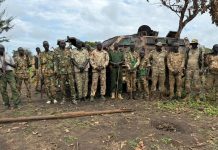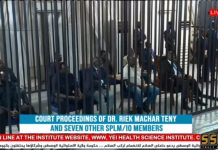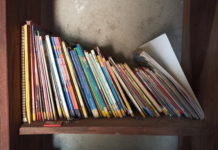
Syndicate (©The Niles)
For more than 21 years, refugees from South Sudan and the Democratic Republic of Congo have lived peacefully alongside Ugandans in West Nile. It is common to find repeat refugees who have fled to Uganda when fighting breaks out in their home countries.
Refugees in Uganda enjoy free health facilities and public schools. They are allowed to work and conduct business. The Ugandan borders are open to refugees and each day 500 people enter Uganda fleeing conflict, mostly from DR Congo and South Sudan.
UNHCR’s chief Filippo Grandi praised Uganda’s refugee programme as one of the best in the world when he visited Uganda earlier this year.
But there is another factor in helping refugees from South Sudan and DR Congo integrate into Uganda: radio.
On Wednesday evenings, refugees can tune into Radio Pacis for the “Refugee Hour” where presenter Ayikobua Noel discusses the concerns of refugees by airing vox pops and interviews with refugees living in settlements.
An influx of phone calls usually follows and discussions and recommendations on how to improve the livelihood of refugees living in the region are talked about.
“Once the Internet is working faster, we shall start broadcasting online”
Radio stations like Rainbow FM will soon start airing via the internet to reach out to Ugandans in the diaspora of West Nile origin and refugees whose relatives live abroad.
“To expand our coverage, we began by installing a new transmitter and improved our antenna,” Denis Ocuna, the station manager of Rainbow Radio told The Niles.
“This helped us go from just covering a radius of 70 kilometres to covering the entire West Nile. Once the Internet is working faster, we shall start broadcasting online.”
Programmes that promote business
Radio Paidha, based in Zombo, airs “Cross-Border Mix”. During this show, presenter Omirambe Wod Angal hosts various entrepreneurs and officials to discuss market trends.
Wod also highlights commodity prices, alerts about the various dates for market days in Uganda and Congo and shares the currency exchange rates for the week.
The programme also promotes business between Uganda, Congo and South Sudan. “The exchange rate alerts are very helpful to our listeners,” Omirambe says.
“This is because our currency markets are not fully regulated yet a lot of people come in through the border and need to exchange currency. This is one reason this programme was created,” he said.
DR Congo is also expanding its radio coverage. Stations like La Colombe FM and Ndrele FM have broadened their coverage to reach Uganda and are also broadcasting in Ugandan languages.
West Nile fan clubs have managed to integrate all the three communities. Radio stations hold fan club games. The radio fans, locals, and refugees gather at a sports field and cheer on as their teams go to battle on the football field. Radio fans also get to meet their celebrated radio presenters.
But the real results of the media integration between the three countries is that people are beginning to look at each other as brothers. Intermarriages are common and refugees have joined the Ugandan community.




